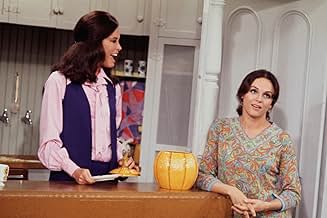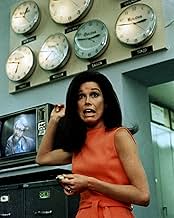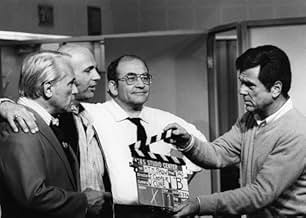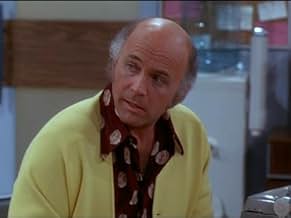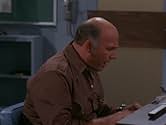Das Leben und die Prüfungen einer jungen alleinstehenden Frau und ihrer Freunde, sowohl am Arbeitsplatz als auch zu Hause.Das Leben und die Prüfungen einer jungen alleinstehenden Frau und ihrer Freunde, sowohl am Arbeitsplatz als auch zu Hause.Das Leben und die Prüfungen einer jungen alleinstehenden Frau und ihrer Freunde, sowohl am Arbeitsplatz als auch zu Hause.
- 29 Primetime Emmys gewonnen
- 46 Gewinne & 82 Nominierungen insgesamt
Folgen durchsuchen
Empfohlene Bewertungen
For the longest period of time, I couldn't understand the appeal of "The Mary Tyler Moore Show". Having caught the occasional episode every now and then, the series struck me as being somewhat "ordinary" in nature. However, at the beginning of 2002, I began to watch the series on a regular basis, right from it's first season and found to my surprise, what a funny, insightful and entertaining sitcom it was.
Mary Tyler Moore deserves kudos for her portrayal of Mary Richards, a ground-breaking character who was allowed to be her own person (a rare thing for female characters on television in those days). An intelligent, independent young woman in her 30's, whose wasn't "hung up" on not being married, and enjoyed her life and her career. The rest of the cast also deserve mention for their memorable performances. Ed Asner as the gruff, yet lovable Lou Grant (Mary's boss at WJM-TV), Valerie Harper as the sharp and sassy Rhoda Morgenstern (Mary's best friend and next door neighbour), Gavin Macloud as the witty & thoughtful Murray Slaughter (Mary's fellow work mate at WJM), the late Ted Knight as the self absorbed and talentless Ted Baxter (who "anchored" the news in more ways than one at WJM-TV) and Cloris Leachman as the flighty and somewhat over-opininated Phyllis Lindstorm (Mary's other next door neighbour and friend).
The show was fortunate enough to benefit from first rate scripts from talented writers such as Jim Brooks & Allan Burns (both of whom created the series), Treva Silverman, David Lloyd, Bob Ellison and Ed Weinberger.
Along with solid direction from vetran TV sitcom director Jay Sandrich (of "I Love Lucy" fame), it comes as no surprise that the series was both a critical and commerical success during it's seven year run on US television from 1970 to 1977. The show also benefited from later additions to the cast such as Georgia Engel as the sweet natured, yet rather naive Georgette Franklin (who was introduced into the series as a love interest for the idiotic Ted Baxter) and Betty White as the conniving & man-hungry Sue Ann Nivens (host of "The Happy Homemaker" show at WJM-TV). On screen, she is the image of domestic knowledge and bliss, but once the camera's have stopped rolling, she is a woman on the prowl, striking at any man within distance (single or otherwise) who grabs her fancy!!. Earning a whole swag of Emmy Awards, the show was highly praised and rewarded for it's stellar efforts. I recommended those who are unfamiliar with the show to watch the series from the beginning, to appreciate and understand the nature of what it's all about. The humour is natural and witty (unlike many other sitcoms where the laughs are either forced or over-the-top). The characters grow and change over the years (once again unlike many other comedy shows), and the series itself contains it's own warmth and natural charm. Check it out and see why this lady can still turn the whole world on with that smile ...
Mary Tyler Moore deserves kudos for her portrayal of Mary Richards, a ground-breaking character who was allowed to be her own person (a rare thing for female characters on television in those days). An intelligent, independent young woman in her 30's, whose wasn't "hung up" on not being married, and enjoyed her life and her career. The rest of the cast also deserve mention for their memorable performances. Ed Asner as the gruff, yet lovable Lou Grant (Mary's boss at WJM-TV), Valerie Harper as the sharp and sassy Rhoda Morgenstern (Mary's best friend and next door neighbour), Gavin Macloud as the witty & thoughtful Murray Slaughter (Mary's fellow work mate at WJM), the late Ted Knight as the self absorbed and talentless Ted Baxter (who "anchored" the news in more ways than one at WJM-TV) and Cloris Leachman as the flighty and somewhat over-opininated Phyllis Lindstorm (Mary's other next door neighbour and friend).
The show was fortunate enough to benefit from first rate scripts from talented writers such as Jim Brooks & Allan Burns (both of whom created the series), Treva Silverman, David Lloyd, Bob Ellison and Ed Weinberger.
Along with solid direction from vetran TV sitcom director Jay Sandrich (of "I Love Lucy" fame), it comes as no surprise that the series was both a critical and commerical success during it's seven year run on US television from 1970 to 1977. The show also benefited from later additions to the cast such as Georgia Engel as the sweet natured, yet rather naive Georgette Franklin (who was introduced into the series as a love interest for the idiotic Ted Baxter) and Betty White as the conniving & man-hungry Sue Ann Nivens (host of "The Happy Homemaker" show at WJM-TV). On screen, she is the image of domestic knowledge and bliss, but once the camera's have stopped rolling, she is a woman on the prowl, striking at any man within distance (single or otherwise) who grabs her fancy!!. Earning a whole swag of Emmy Awards, the show was highly praised and rewarded for it's stellar efforts. I recommended those who are unfamiliar with the show to watch the series from the beginning, to appreciate and understand the nature of what it's all about. The humour is natural and witty (unlike many other sitcoms where the laughs are either forced or over-the-top). The characters grow and change over the years (once again unlike many other comedy shows), and the series itself contains it's own warmth and natural charm. Check it out and see why this lady can still turn the whole world on with that smile ...
It's hard for people to remember what American TV was like at the time (even for people who were alive and conscious then) in the hugely formulaic post-PETTICOAT JUNCTION era.
And I've known a lot of people who today look at the first season of "MTM" where the jokes are broader and don't always quite work and the acting is a bit too "loud" and stagey, and they wonder why this show was so well-regarded, then and now --- often to the point that they can't make it thru to later seasons.
I guess that's understandable. It's hard to believe very-very early episodes of "MTM" about Mary and Rhoda joining a divorce club and its strained humor was actually looser and freer and more amusing than what other sitcoms of the day had to offer. But it's true.
Although the first year of the show may be only sporadically humorous, it makes up for it in that "MTM" did one of the best jobs of capturing that weird melancholy of the era --- that mood that kind of defined the '70s, and was even more intense at the very start of the decade: this sort of lost, disillusioned, bittersweet, post-60s flavor which made everybody immediately seem as if they had a "past" from the moment they appeared on screen...
For anybody looking to see what it actually felt like living in the world at that particular moment in time -- at the cusp of the '60s and '70s -- it's captured vividly by such period montage sequences as the urban street scenes in MIDNIGHT COWBOY (1969) or the snow angels/ice skating sequence in LOVE STORY (1970) or the "MTM" show opening theme design from Season 1, even Mary and little Bess going shopping in a Minneapolis mall, etc...
The world actually felt that way at the time. It's not just a Hollywood construct.
To me, Season 1 of "MTM" is kind of a portal to 1970. I regarded it as such even as early as the late-70s (when the show was first in syndication) and it still hits me the same way whenever I see very early installments--- the look of the show and the forlorn music score... No, the comedy isn't quite as hilarious by the slick standards of sitcoms from more recent decades (or even compared to later episodes of the same show) but I still find the mood almost heart-breakingly captivating. It is so evocative of the era.
As the seasons rolled on, the comedy got sharper (by the standards of the day) even though that '70s somberness was gradually mitigated as it lessened in real life.
So it's a time capsule of sorts... One would think every show and movie filmed in a particular era would be, but that just isn't true. Clothes and cars from a period don't sell or convey the past to the present --- something has to be good, or at least right-minded, in order for the zeitgeist of the era in question to stick to celluloid. And "MTM" was one of those shows that did so.
It was also one of the rare series then to proceed in "real time" which gave the show a life, an energy, that most didn't have, even though it didn't delve into the then-shocking, in-your-face politics that ALL IN THE FAMILY soon would.
Folks who weren't around then probably aren't able to grasp how fresh this "MTM" show seemed back in 1970, given where TV was at the time. Or understand why all the terribly broad (some might even say groan-inducing) comedy directed at, and derived from, Ted Baxter during Season 1 -- which predominantly focused on his dumbness and inability to pronounce basic words -- could possibly ever have been once seen as "funny".
In fact, it was, however briefly, fall-off-the-couch funny. TV in the 1960s had fervently ignored the social changes of that decade (including the questioning of establishment authority) so seeing a revered image like the silver-haired newsreader held up as a buffoon was actually considered edgy, even though that context doesn't really "read" today. (That's not revisionism, I swear. And at least the writers realized they would soon have to write to Ted's narcissism and density in a more layered, sophisticated fashion, and they quickly did so.)
That says more about where the media culture was circa 1969 or 1970 than it does THE MARY TYLER MOORE SHOW.
For all of the above reasons, Mary Richards became metaphorical for the early-to-mid 1970s, almost by accident: TV changed more between 1970 and 1975 than any other five year period in its history, in terms of content, and the television sitcom genre had literally become an agent for social change. And Mary Richards likewise grew during the seven years of the series from the quivery, vulnerable, lanky girl with the long, raven hair who let herself be gently bullied into giving up her family holiday visit at Christmas to cover for her co-workers in that 1970 episode (so wistfully forlorn for reasons hard to explain, except that it, too, captures the poignant atmosphere of the time precisely) into the almost cocky, seasoned professional who didn't pause to deliver a zinger to Ted or SueAnn when circumstances demanded it, and could grab and kiss her latest boyfriend in a public restaurant and then fluff her hair tauntingly at her voyeuristic co-workers as she sauntered out the front door.
Mary had grown up with us, or at least with the television medium, during it's most significant period of progression.
And then there's the actress herself, Mary Tyler Moore, whose own personal melancholia seemed to parallel that of the earlier part of that decade. Even with the same writers and co-stars, the show would never have felt the same without Moore and her intrinsic sense of haunted, detached nostalgia wrapped in winter's chill.
And I've known a lot of people who today look at the first season of "MTM" where the jokes are broader and don't always quite work and the acting is a bit too "loud" and stagey, and they wonder why this show was so well-regarded, then and now --- often to the point that they can't make it thru to later seasons.
I guess that's understandable. It's hard to believe very-very early episodes of "MTM" about Mary and Rhoda joining a divorce club and its strained humor was actually looser and freer and more amusing than what other sitcoms of the day had to offer. But it's true.
Although the first year of the show may be only sporadically humorous, it makes up for it in that "MTM" did one of the best jobs of capturing that weird melancholy of the era --- that mood that kind of defined the '70s, and was even more intense at the very start of the decade: this sort of lost, disillusioned, bittersweet, post-60s flavor which made everybody immediately seem as if they had a "past" from the moment they appeared on screen...
For anybody looking to see what it actually felt like living in the world at that particular moment in time -- at the cusp of the '60s and '70s -- it's captured vividly by such period montage sequences as the urban street scenes in MIDNIGHT COWBOY (1969) or the snow angels/ice skating sequence in LOVE STORY (1970) or the "MTM" show opening theme design from Season 1, even Mary and little Bess going shopping in a Minneapolis mall, etc...
The world actually felt that way at the time. It's not just a Hollywood construct.
To me, Season 1 of "MTM" is kind of a portal to 1970. I regarded it as such even as early as the late-70s (when the show was first in syndication) and it still hits me the same way whenever I see very early installments--- the look of the show and the forlorn music score... No, the comedy isn't quite as hilarious by the slick standards of sitcoms from more recent decades (or even compared to later episodes of the same show) but I still find the mood almost heart-breakingly captivating. It is so evocative of the era.
As the seasons rolled on, the comedy got sharper (by the standards of the day) even though that '70s somberness was gradually mitigated as it lessened in real life.
So it's a time capsule of sorts... One would think every show and movie filmed in a particular era would be, but that just isn't true. Clothes and cars from a period don't sell or convey the past to the present --- something has to be good, or at least right-minded, in order for the zeitgeist of the era in question to stick to celluloid. And "MTM" was one of those shows that did so.
It was also one of the rare series then to proceed in "real time" which gave the show a life, an energy, that most didn't have, even though it didn't delve into the then-shocking, in-your-face politics that ALL IN THE FAMILY soon would.
Folks who weren't around then probably aren't able to grasp how fresh this "MTM" show seemed back in 1970, given where TV was at the time. Or understand why all the terribly broad (some might even say groan-inducing) comedy directed at, and derived from, Ted Baxter during Season 1 -- which predominantly focused on his dumbness and inability to pronounce basic words -- could possibly ever have been once seen as "funny".
In fact, it was, however briefly, fall-off-the-couch funny. TV in the 1960s had fervently ignored the social changes of that decade (including the questioning of establishment authority) so seeing a revered image like the silver-haired newsreader held up as a buffoon was actually considered edgy, even though that context doesn't really "read" today. (That's not revisionism, I swear. And at least the writers realized they would soon have to write to Ted's narcissism and density in a more layered, sophisticated fashion, and they quickly did so.)
That says more about where the media culture was circa 1969 or 1970 than it does THE MARY TYLER MOORE SHOW.
For all of the above reasons, Mary Richards became metaphorical for the early-to-mid 1970s, almost by accident: TV changed more between 1970 and 1975 than any other five year period in its history, in terms of content, and the television sitcom genre had literally become an agent for social change. And Mary Richards likewise grew during the seven years of the series from the quivery, vulnerable, lanky girl with the long, raven hair who let herself be gently bullied into giving up her family holiday visit at Christmas to cover for her co-workers in that 1970 episode (so wistfully forlorn for reasons hard to explain, except that it, too, captures the poignant atmosphere of the time precisely) into the almost cocky, seasoned professional who didn't pause to deliver a zinger to Ted or SueAnn when circumstances demanded it, and could grab and kiss her latest boyfriend in a public restaurant and then fluff her hair tauntingly at her voyeuristic co-workers as she sauntered out the front door.
Mary had grown up with us, or at least with the television medium, during it's most significant period of progression.
And then there's the actress herself, Mary Tyler Moore, whose own personal melancholia seemed to parallel that of the earlier part of that decade. Even with the same writers and co-stars, the show would never have felt the same without Moore and her intrinsic sense of haunted, detached nostalgia wrapped in winter's chill.
This truly was one of the first ensemble driven situation comedies in the history of television. Even though Mary Tyler Moore was the star of the show, the fact was that the series truly revolved around her relationships with not only her friends at home, but her friends on the job and when those two worlds collided, sparks usually flew. Also, this show was really funny when Valerie Harper was still on the show playing Rhoda. She and Mary were polar opposites (Mary the cheerful optimist and Rhoda the angry cynic). However, those differences was what made their relationship shine. Cloris Leachman was also perfect as the over bearing Phyllis Lindstrom. And lets not forget the other characters; cynical Lou, the optimistic Murray and, of course, dimwitted Ted Baxter. This show definitely one of the all time classics and made Saturday nights worth staying home.
Another interesting fact about this show is the fact that it debuted during the final season of the original series about a single woman trying to make it, "That Girl". However, while Ann pretty much was still an innocent little girl at heart that had a boyfriend and often still relied on him and her parents to get her out of jams, Mary Richards proved that she could be single and live her life on her own terms.
Another interesting fact about this show is the fact that it debuted during the final season of the original series about a single woman trying to make it, "That Girl". However, while Ann pretty much was still an innocent little girl at heart that had a boyfriend and often still relied on him and her parents to get her out of jams, Mary Richards proved that she could be single and live her life on her own terms.
The backstory: Mary Richards moves to Minneapolis, MN, specifically into an apartment with a sunken in living room. She applies for a job at a local television newsroom with high aspirations. The show not only deals with situation comedy, but with how a woman could "make it after all" in a male dominated workforce. Mary becomes close with her newsroom family, from tough-love boss Lou Grant to bumbling news anchorman Ted Baxter. She also deals with wacky neighbor Phyllis and of course, wise cracking Rhoda. The show is great because you care about all the characters and while funny, it can still deliver a strong message. Truly one of the best shows on television.
I always enjoyed The Mary Tyler Moore Show. The characters were all funny, especially the goofy fights between Ted Baxter and Murray Slaughter. Lou Grant ("I hate spunk!") was always good for a laugh, especially the episode where he ended up drunk on Mary's doorstep!
Of course, the real two stars of the series were Mary Tyler Moore (duh) as Mary Richards and Valerie Harper as her best friend, Rhoda Morgenstern. My all-time favorite episode is the second one, where the two host a small gathering at Mary's apartment for two potential suitors, and everything goes wrong!
A true classic, and it earned every Emmy it got.
Of course, the real two stars of the series were Mary Tyler Moore (duh) as Mary Richards and Valerie Harper as her best friend, Rhoda Morgenstern. My all-time favorite episode is the second one, where the two host a small gathering at Mary's apartment for two potential suitors, and everything goes wrong!
A true classic, and it earned every Emmy it got.
Wusstest du schon
- WissenswertesProducers wanted "someone like Betty White" to play Sue Ann Nivens. Eventually, someone asked, "Why not cast Betty White?"
- PatzerIn the first season installment "Divorce Isn't Everything", Mary mentions that she can't speak French but can speak Spanish. Later in the series, while at a Mexican restaurant, she indicates that she can't read the menu because she took French in college.
- Zitate
Lou Grant: You know, Mary, you've got spunk.
Mary Richards: Why, thank you, Mr. Grant.
Lou Grant: I hate spunk.
- Crazy CreditsIn episode 71 the MTM Kitten was replaced by Miss Moore herself, saying "Th-th-th-that's all folks!", a line spoken by Mary Richards during that episode.
- VerbindungenFeatured in The 23rd Annual Primetime Emmy Awards (1971)
Top-Auswahl
Melde dich zum Bewerten an und greife auf die Watchlist für personalisierte Empfehlungen zu.
- How many seasons does The Mary Tyler Moore Show have?Powered by Alexa
Details
- Laufzeit30 Minuten
- Farbe
- Seitenverhältnis
- 4:3
Zu dieser Seite beitragen
Bearbeitung vorschlagen oder fehlenden Inhalt hinzufügen







